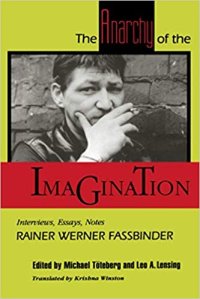
Ebook: The Anarchy of the Imagination: Interviews, Essays, Notes
Author: Rainer Werner Fassbinder, Leo A. Lensing (editor), Michael Töteberg (editor), Krishna Winston (transl.)
- Series: PAJ books
- Year: 1992
- Publisher: Johns Hopkins University Press
- Language: English
- pdf
Translation of: Filme befreien den Kopf and Die Anarchie der Phantasis.
In Rainer Werner Fassbinder's A Year of Thirteen Moons, the camera watches the prostitute Red Zora as she watches Fassbinder in a television interview. The actress is Ingrid Caven, the director's former wife and the woman with whom he claims to have his most important "elective affinity." At once provocative and revealing, the scene illustrates Fassbinder's interest in blurring the boundaries between art and life, between fiction and autobiography. His public comments - like his films and plays - were occasions for aesthetic experimentation rich in irony and drama.
The Anarchy of the Imagination collects Fassbinder's most important interviews, essays, and working notes - nearly all presented here for the first time in English. They are an indispensable record of the self-understanding and self-stylization of this major artist, one of the most influential cultural figures to emerge from postwar Germany. Fassbinder's essays and other writings commanded a degree of public attention rarely achieved by film makers in the United States. His articles appeared in major newspapers such as the Frankfurter Rundschau and Die Zeit, where they both influenced the cultural scene and intervened in the acrimonious debates on terrorism and anti-Semitism that swept West Germany in the late 1970s and early 1980s.
Whether Fassbinder is reflecting on his own work or writing about fellow film makers, whether he is describing his discovery of actress Hanna Schygulla or speaking out in favor of political film making, his perspective is radical, subjective, and challenging. The writings in this volume are not only about films, but about love, longing, dependency, repressed wishes, and dreams. They are an essential part of Fassbinder's legacy, the remarkable body of work in which present-day German reality finds brilliant expression.
In Rainer Werner Fassbinder's A Year of Thirteen Moons, the camera watches the prostitute Red Zora as she watches Fassbinder in a television interview. The actress is Ingrid Caven, the director's former wife and the woman with whom he claims to have his most important "elective affinity." At once provocative and revealing, the scene illustrates Fassbinder's interest in blurring the boundaries between art and life, between fiction and autobiography. His public comments - like his films and plays - were occasions for aesthetic experimentation rich in irony and drama.
The Anarchy of the Imagination collects Fassbinder's most important interviews, essays, and working notes - nearly all presented here for the first time in English. They are an indispensable record of the self-understanding and self-stylization of this major artist, one of the most influential cultural figures to emerge from postwar Germany. Fassbinder's essays and other writings commanded a degree of public attention rarely achieved by film makers in the United States. His articles appeared in major newspapers such as the Frankfurter Rundschau and Die Zeit, where they both influenced the cultural scene and intervened in the acrimonious debates on terrorism and anti-Semitism that swept West Germany in the late 1970s and early 1980s.
Whether Fassbinder is reflecting on his own work or writing about fellow film makers, whether he is describing his discovery of actress Hanna Schygulla or speaking out in favor of political film making, his perspective is radical, subjective, and challenging. The writings in this volume are not only about films, but about love, longing, dependency, repressed wishes, and dreams. They are an essential part of Fassbinder's legacy, the remarkable body of work in which present-day German reality finds brilliant expression.
Download the book The Anarchy of the Imagination: Interviews, Essays, Notes for free or read online
Continue reading on any device:

Last viewed books
Related books
{related-news}
Comments (0)